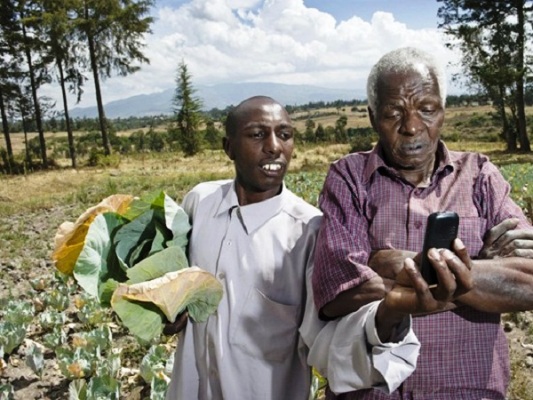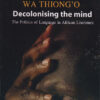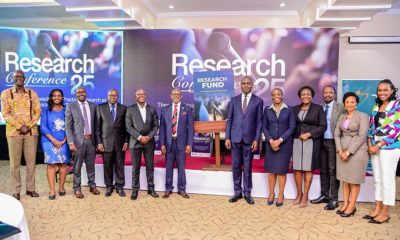Editor
ICT tools make life better for farmers

ICT tools like mobile phones are some of the channesl to improve agriculture
For many years, Emily Akallu’s family suffered the harsh and frequent realities of dependence on rain-fed agriculture, which imprisoned her, literally to poverty.
Her length experience in the growing of soy beans in her home district of Alebtong, did little to improve her fortunes arising mostly from the growing of low yielding varieties, lack of capital for expansion among other financing constraints faced by farmers.
Over the past few months, one private company has developed innovative mobile-phone based opportunities that help farmers access favorably-priced inputs such as seeds, fertilisers but also good terms to repay the money, all that without having to move distances but rather with the power of a mobile phone.
The advent of the mobile phone and the subsequent other innovations have brightened the chances of the poor lady and indeed millions of people in Northern Uganda by enabling them to access critical inputs into their gardens and repay when they harvest.
Now the private company known as m-Omulimisa Ag-tech company, one of the numerable ICT driven start-ups, is the one behind the sense of relief among poor farmers in Alebtong.
The company uses an application called m-Omulimisa and village agents to work with farmers to to help them procure inputs as cheaper prices and pay for them when they harvest. The farmers can also access the backed-up frequently asked questions that offer solutions to some of the questions by farmers.
Speaking to this writer, Akullo praised the innovation noting that the lending option allows them to invest without having cash.
“I have received free seeds (literally) and am ready to plant, my family is happy,” she excitedly said.
Data by Bank of Uganda and other financing institutions have concluded that access to finance especially by smallholder farmers is a critical hindrance to the adoption of commercial farming by millions of Ugandan households. Hence the slow growth of the agriculture sector.
Despite years of preaching the wealth creation doctrine, President Museveni has yet to show the fruits of efforts. Majority of Ugandan farmers are still shackled to rain fed subsistence farming. Over 60% of the farmers source their livelihoods in subsistence which is dominantly practiced in rural areas of Uganda.
Erratic weather, has compounded the challenges of poor access to credit
The National Information Technology Authority-Uganda (NITA-U) reported in April 2019 that almost 24.8 million or 70.9 per cent of Ugandans own mobile phones. Outstandingly, it was revealed that rural folks outpaced urban people in terms of growth in mobile phone ownership. This rural population mobile phone penetration provides a unique opportunity that public-private partnerships should leverage to enhance access to financial services and ensure financial inclusion.
While speaking to this writer, Akullo, one of the beneficiaries of m-Omulimisa’s ‘bundled product’, expressed utmost appreciation of the initiative. “I have received free (literally) seeds of good quality and am ready to plant, my family is happy,” she excitedly said.
According to the company’s Chief Executive Director, Daniel Ninsima, the Resilient Africa Network (RAN) funded start-up ‘successfully’ disbursed over 12 tons of inputs worth 110 million shillings to 14 farmer groups consisting of 420 farmers. The beneficiaries are smallholder farmers in the districts of Kole, Apac, Lira, Alebtong, and Kwania.
Leveraging the mobile phone penetration, the company operates a mobile enabled “Village Agent Model” to aggregate farmers’ inputs and outputs in addition to helping farmers, secure low-interest micro-credit from Microfinance Support Centre. They the phones to distribute quality inputs.
And that is not all. Farmers also acquire subsidized agricultural insurance to mitigate the adverse effects of climate change
Examining the several government agriculture financing initiatives of over the years tends to suggest that the problem could largely be attributed to weak institutional framework and policy inconsistency. The 2018 International Finance Corporation (IFC) report put emphasis on the role of the private sector in addressing key challenges like climate change and poverty. An excerpt reads in part that, “…private sector solutions now stand at the forefront of development thinking — addressing more difficult challenges, in more countries, than ever before…” It speaks to the urgency to undertake public-private partnerships in the effort to address society’s major challenges.
For the president’s wealth creation campaign to materialize, the role of public-private partnerships must be underscored. Government must leverage the potential of ICT as an enabler, to ensure easy access to affordable financial services and to break barriers constraining financing of investment in the agricultural sector.
Jonan Twinamatsiko. tjonans@gmail.com
Comments


























